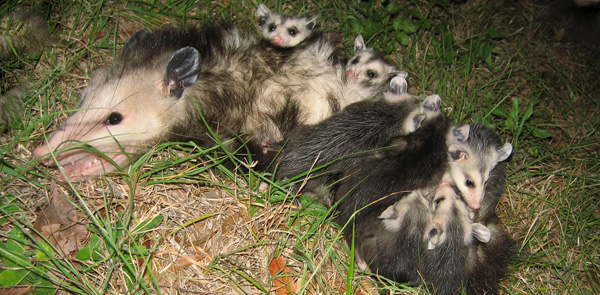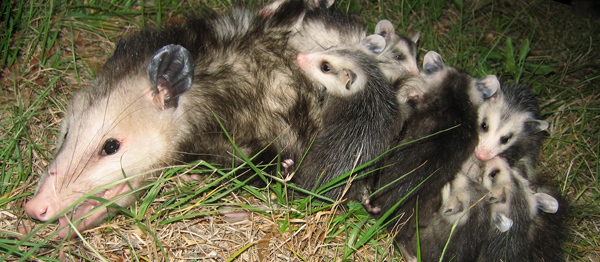- info@wildlife-removal.com
Call us for help in your town
Wildlife Removal Education
What Should You Do If You Find A Nest of Baby Opossums?
Need opossum removal in your hometown? We service over 500 USA locations! Click here to hire us in your town and check prices - updated for year 2020.
It is true that adult opossums can cause considerable structural damage to a building by chewing on the insulation, and may steal your pet foods, make huge messes everywhere with their droppings and urine, and probably spread infections; but the babies, called joeys, are quite harmless and should be handled with care.

If you find a nest of baby opossums without their mother around, it is a high likelihood that their mother is either dead or trapped somewhere, because a female opossum will not abandon her litter this way. You may hold up for a bit and observe to see if the mother will return.
If the mother continues to be absent, it can then be concluded that she is no more and you have to decide what to do with the litter. Leaving them there could mean starvation and death for them as they may not yet be able to fend for themselves.
- It is doubtful that the state laws would permit for you to adopt and care for the baby possums. But if it does, put them in a box and place them in more stable temperature. They also need to be rehydrated. Then obtain information on how to raise them
- Instead of raising them, contact animal rehabilitators and let them take over the care of the babies. While you await them, put the baby opossums in a box and rehydrate them with water. Animal rehabilitators are in a better position to help them survive as they are trained professionals.
Remember not to handle baby opossums with your bare hands, always wear protective gloves. Their small size does not exclude them from being possible carriers of disease pathogens, which they may have picked up from their mother or the nest where they lived.
Go back to the Opossum Removal page.
Can an Opossum Under Your Shed or Porch Have Babies?
It is very likely that an opossum living under a shed or porch will have a nest of babies. This is because female opossums habitually seek dark and enclosed shelter-like spaces in which to build a nest, where they give birth and take care of their young.

Opossums give birth to hairless, blind and not-so-pretty babies that are unable to survive on their own. As a result, baby opossums are highly dependent on their mother for everything for the first few months of their lives. They are housed inside the mother's pouch (marsupium) from the time that they are born, there they feed by clinging to one of the thirteen tiny teats on their mother’s underside. The baby opossums go everywhere the mother goes because they literally live inside of her for 8 to 12 weeks.
Young opossums leave their mother’s pouch when they are two to three months old but continue to nurse in their mother’s pouch for another month or two. At this stage, they latch onto the mother's back as she forages and start learning to eat solid foods. Afterwards, they get weaned and become independent.
During these growth stages, the need for a secure shelter to protect them from predators necessitates that the mother build a nest for them. And if your shed or porch is comfortable enough, they would not hesitate to move in there.
Some situations do arise where baby opossums are left on their own in the nest. For instance, at the death of the mother. In those rare case where the mother dies after giving birth or while still nurturing her babies, the young possums may have no option than to leave the pouch and start living in the nest. However, their chances of survival are slim and they are very likely to die off before they reach maturity.
If by some chance, you happen upon a nest of baby opossums under a shed or porch, do not kill or harm them. At that stage, they are harmless and delicate. You may choose to take care of them if this is legal in your area, or in the alternative, hand them over to a professional animal handler.
Go back to the Opossum Removal page.


















